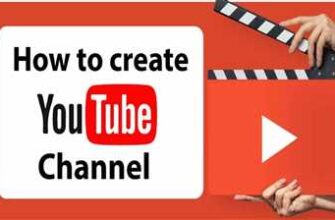
Creating a website can seem like a daunting task, but with the right tools and knowledge, it doesn’t have to be. There are many different options available for building a website, from using templates to hiring a pro to do it for you. Whether you’re a business owner looking to establish an online presence or an individual looking to share your passions with the world, having a website can open up many opportunities for you.
One of the first things you need to know about creating a website is that it’s not as hard as it may seem. With the help of various online platforms and webmastering services, you can easily build a website even if you have no prior experience. Platforms like Canva offer templates and customization options that make it easy to create professional-looking websites without having to start from scratch.
Having a well-designed website is essential for reaching your target audience and making a good impression on potential customers or clients. Your website should be organized and easy to navigate, with clear and concise content that provides all the necessary information. It should also be SEO-optimized, with relevant keywords and meta-tags to improve its visibility in search engine rankings.
Another important aspect of website creation is communication with your visitors. You want to provide them with ways to contact you, whether it’s through a contact form, email, or social media networks. The more options you give them, the more likely they are to reach out to you. This open line of communication allows you to engage with your audience and build a relationship with them.
Customization is another key feature of a successful website. You want your website to reflect your brand and personality, so it’s important to choose colors, fonts, and images that align with your message. Customization also includes adding features like video integration, links to your blog or other services, and advanced options for a more interactive user experience.
When it comes to website creation, having expertise in web development can be a pro, but it’s certainly not a con if you don’t. There are plenty of tools and resources available online to help you build a website, even if you’re not a coding expert. Taking advantage of these resources can save you time and money, and ensure that your website is effective in reaching your goals.
Do You Really Need a Website?
In today’s digital age, having a website is no longer just an option, it is a necessity. Whether you run a small business, are a freelancer, or want to establish an online presence, having a website can open up a whole new fold of opportunities for you. A website is like a virtual storefront that provides information about your business, products, and services to potential customers.
Having a website allows you to customize your online presence and communicate with your visitors in a way that other media platforms, such as social networks or blogs, cannot. It provides a central place where everyone can go to get the information they need, organized in a way that is easy to navigate. Without a website, you may appear unprofessional or outdated.
Moreover, having a website is a great way to reach potential clients or customers. It opens up a whole new world of possibilities by providing advanced features such as SEO-optimized content, links to your social media networks, and customized contact pages. With a website, you can showcase your expertise and showcase the different services or products you offer.
While it’s true that building a website can be hard and may require some technical expertise, there are many online platforms available that make it easy for anyone to create a website without having to know webmastering or coding. These platforms offer a wide range of templates and customization options, making it possible for you to have a professional and effective website without the need for advanced web development skills.
There are some cons to consider as well. Building a website can be time-consuming, and you’ll need to keep it updated with fresh and engaging content. It’s also important to have a responsive design that works well on different devices, as many people now use their smartphones or tablets to browse the web.
However, the pros outweigh the cons when it comes to having a website. With a website, you have the ability to showcase your products or services to a larger audience, drive traffic from search engines, and communicate effectively with your clients or customers. It’s an essential tool for any business or individual looking to establish a strong online presence and take advantage of the opportunities the internet has to offer.
Taking Your Business Online Video
If you’re a business owner, you know how important it is to have an online presence. With so many people using the internet to search for products and services, having a website is a must. But building a website isn’t always easy, especially if you don’t have experience in webmastering. That’s where tools like Canva come in.
Canva is an online platform that makes it easy for anyone to create a website. With their user-friendly interface and pre-designed templates, you can quickly create pro-looking pages without any coding or design expertise. Their drag-and-drop features allow you to customize your website to fit your business needs.
One of the pros of using Canva is the variety of options they offer. They have templates for different industries, so you can find one that suits your business. They also have advanced customization features, allowing you to make your website truly unique. With Canva, you can easily add features like contact information, product pages, and social media links to keep your customers informed and engaged.
However, there are some cons to using Canva. While it’s great for beginners, more experienced webmasters may find it limiting. The customization options are not as extensive as what you would have with a coding platform. Additionally, SEO-optimized content can be harder to achieve on Canva compared to platforms specifically designed for search engine optimization.
Another con is the lack of communication features. Canva is primarily focused on web design, so there are limited options for customer interaction. If having a blog or a place for clients to reach you is important, you may need to look for other services to integrate with your Canva website.
Despite these cons, Canva is still a great option for businesses looking to create an effective online presence. Their templates and easy-to-use interface make it possible for anyone to create a professional-looking website without the need for expert webmastering skills. Whether you’re just starting out or looking to revamp your current online presence, a video tutorial on taking your business online with Canva can provide valuable tips and insights.
In conclusion, taking your business online is no longer a conundrum with tools like Canva. It offers a range of templates and customization options to help you create a website that showcases your products or services. While there may be limitations in terms of advanced features and communication, Canva is a user-friendly platform that can help you reach your customers in an effective and visually appealing way.
Place your contact information above the fold
When building a website, one of the most important things to consider is the placement of your contact information. By placing it above the fold, you make it easily accessible to visitors and potential customers.
Having your contact information readily available allows your clients and customers to get in touch with you easily. This can increase their trust in your website and make them more likely to reach out to you for your products or services.
There are many different options for placing your contact information above the fold. One popular option is to use a header or banner at the top of your website that includes your contact information. This can include your phone number, email address, and any social media links that you have.
Another option is to include a contact form or a button that opens a contact form. This allows visitors to easily send you a message or inquire about your services without having to leave the page they are on.
Some experts recommend placing your contact information in the header of your website, while others suggest placing it in the sidebar or footer. Ultimately, the placement will depend on the design and layout of your website, as well as your personal preference.
It’s also important to consider the customization options that your website builder or platform provides. Some platforms, like WordPress, allow for more advanced customization options that can help you place your contact information exactly where you want it.
Having your contact information above the fold can also benefit your search engine optimization (SEO) efforts. Search engines often prioritize content that is above the fold, so having your contact information in this prominent location can help improve your website’s search engine rankings.
However, it’s worth noting that there are also some cons to placing your contact information above the fold. If your website is poorly organized or cluttered, having your contact information prominently displayed can make it look unprofessional and may discourage visitors from reaching out to you.
To ensure a positive user experience, it’s important to keep your website clean and organized, with easy-to-find contact information. By doing so, you’ll be able to take advantage of the opportunities that having your contact information above the fold can provide.
Pros and Cons
When it comes to creating websites, there are a lot of pros and cons to consider. Let’s take a look at some of them:
Pros:
- Easy to use: With the right tools, creating a website can be relatively easy. Templates and drag-and-drop features make it simple for anyone to build a website.
- Cost-effective: Building a website can be a lot cheaper than hiring a professional web designer. There are many free and affordable options available.
- Customization options: You have the ability to customize your website to suit your business and brand. You can choose from different templates, fonts, colors, and layouts.
- Reach a wider audience: Having an online presence allows you to reach customers from all over the world. Your website can attract visitors from search engines, social media, and other online platforms.
- Organized information: Websites provide a structured way to organize and present information. You can have separate pages for different topics and easily navigate through the content.
- Effective communication: Websites serve as a means of communication between you and your clients or customers. You can provide contact information, FAQs, and even live chat options to engage with your audience.
- SEO-optimized: By following SEO best practices, you can optimize your website for search engines. This can help improve your website’s visibility and attract more organic traffic.
Cons:
- Lack of expertise: Building a website requires some level of technical knowledge. If you’re not familiar with web design or development, you may struggle to create a professional-looking website.
- Poorly designed websites: Without proper knowledge or experience, there’s a chance your website may turn out to be poorly designed. This can negatively affect the user experience and deter potential customers.
- Taking time: Building a website can be time-consuming, especially if you want to customize every aspect. It may take a while to get your website up and running.
- Advanced customization: While templates offer customization options, they may not allow for advanced customization. If you have specific design requirements, you may need to hire a professional web developer.
- Keeping up with updates: Websites require regular updates and maintenance to ensure they function properly. This can become a time-consuming task, especially if you have multiple websites.
- Limited features: Some website builders or templates may have limitations in terms of features and functionalities. If you have specific requirements, you may need to explore other options.
In conclusion, creating a website can offer many opportunities for your business, but it’s not without its drawbacks. It’s important to weigh the pros and cons and decide what’s best for your specific needs.
Pro Many Customization Opportunities
When it comes to building a website, there are many options available for customization. Whether you are an expert in webmastering or a novice, there is a platform out there for everyone. One platform that is popular for its easy-to-use customization features is Canva. With Canva, you can customize your website without any expertise in coding or programming.
One of the pros of using a platform like Canva is that it offers many different templates for websites. These templates are designed to be user-friendly and easy to customize, allowing you to create a website that fits your business needs.
Another pro of Canva is that it provides a range of customization options. You can add different types of content to your website, such as images, videos, and blog posts. This helps to keep your website interesting and engaging for your visitors.
Having an open communication with your customers is a pro of using Canva for building websites. You can easily add contact forms to your web pages, allowing your customers to reach out to you with any questions or feedback. This can help to improve your customer experience and build a strong online presence.
Canva also offers SEO-optimized templates, which can help your website reach a larger audience. By optimizing your website for search engines, you can increase your chances of reaching potential customers and growing your business. This is a pro that is essential for any website owner.
While there are many pros to using Canva for website customization, there are also a few cons to consider. One con is that some of the customization options are limited compared to more advanced webmastering services. If you need more advanced customization options, Canva may not be the best fit for your needs.
Another con is that Canva’s templates can sometimes be poorly optimized for search engines. This means that your website may not rank as high in search results as you would like. If SEO is a priority for your website, you may want to consider other options.
In conclusion, using a platform like Canva for website customization has many pros and cons. It offers an easy and user-friendly way to create a customized website without any coding expertise. However, it may not have all the advanced customization options or SEO-optimized templates that some webmasters may need. It’s important to weigh these pros and cons and choose the platform that best fits your business needs.
Pro Easy User Experience

When it comes to building a website, user experience should be a top priority. A poorly designed website can lead to frustration for your visitors and drive them away. On the other hand, an effective website can keep customers engaged and encourage them to stay longer, explore more, and ultimately convert into loyal clients.
So, what can you do to ensure a pro user experience? Here are a few tips:
1. Keep it simple: Information overload can be overwhelming for users. By keeping your website organized and easy to navigate, you can make it easier for everyone to find the information they need without being overwhelmed.
2. Offer customization options: People like to have options. By giving them the ability to customize their website, you can cater to their unique preferences and create a more personalized user experience.
3. Provide clear communication: Make sure that your website clearly communicates what your business is about and what products or services you offer. Include a contact page where visitors can easily reach out to you.
4. Optimize for search engines: Having a great website is important, but it’s equally important to ensure that people can find it. By implementing SEO-optimized content and using relevant keywords, you can improve your website’s visibility on search engines.
5. Incorporate social media: Social media networks offer many opportunities to connect with your audience and promote your business. Include links to your social media profiles on your website, allowing visitors to easily follow and engage with you on those platforms.
6. Provide valuable content: Keeping your website regularly updated with informative and engaging content can help establish your expertise and keep visitors coming back for more.
With all the above tips in mind, it’s important to remember that building a website doesn’t have to be hard. Platforms like Canva offer easy-to-use templates and customization options that even those without advanced webmastering expertise can take advantage of.
So, whether you’re a business owner, a blogger, or someone just looking to build their online presence, creating a website that provides a pro user experience is within your reach. Remember to prioritize the needs of your visitors and keep the overall user experience in mind, and you’ll be on the right track to success!
Con Poorly Organized Templates
Having a website is essential for everyone in this advanced age of technology and communication. It allows businesses and individuals to have an online presence, reach out to customers, and share information and media with the world. However, creating a website can be a daunting task, especially for those who do not have expertise in webmastering.
There are many options available for building a website, such as using website builders like Canva or hiring a professional web designer. While these options make it easy to create a website without needing to know how to code, they can also have their cons, especially if you choose to use poorly organized templates.
One of the main cons of using poorly organized templates is that they may not have the features and customization options that you need for your business or personal website. Templates usually come with pre-designed pages and layouts, but if you want to customize or add new features, it can be hard or sometimes impossible to do so with a poorly organized template.
Another con of using poorly organized templates is that they may not be SEO-optimized. Search engine optimization (SEO) is crucial for the visibility of your website in search engine results. If your template is not properly optimized for SEO, it can be hard to reach your target audience and get the traffic you need for your website.
Furthermore, poorly organized templates may have a negative impact on user experience. If the navigation and layout of the template are not intuitive and easy to use, visitors may find it hard to find the information they are looking for and navigate the website effectively. This can result in a high bounce rate and potential loss of customers or readers.
Lastly, poorly organized templates may not be responsive or mobile-friendly. With the increasing number of people accessing websites through their mobile devices, having a mobile-friendly website is crucial. If your template is not responsive, it may not display properly on different screen sizes, which can be frustrating for your visitors.
In conclusion, while using templates can be a quick and easy way to create a website, it is important to choose well-organized templates that offer customization options, are SEO-optimized, offer a good user experience, and are responsive. Poorly organized templates can limit your opportunities for customization, hinder your online presence, and result in a negative user experience. So, it is crucial to do your research and choose wisely when building your website.
Con: Not SEO-Optimized
When it comes to building a website, one of the most important elements to consider is search engine optimization (SEO). SEO refers to the practices and strategies that help your website rank higher in search engine results. However, there are some cons to having a website that is not SEO-optimized.
Firstly, without SEO optimization, it can be hard for your website to reach its intended audience online. Advanced search algorithms are constantly taking into account various factors to provide the most relevant results to users. Without the expertise and knowledge of SEO, your website may struggle to compete with other websites that are optimized for search.
Secondly, not having an SEO-optimized website can lead to a poor user experience. When a website is not properly organized and structured for search engines, it can make it difficult for users to find the information they are looking for. This can result in a frustrating experience for visitors, leading them to leave your website and look for alternatives.
Another con of not having an SEO-optimized website is that it can limit your opportunities for reaching potential customers. When your website does not appear high in search engine rankings, it can be challenging to attract organic traffic and generate leads. This can be especially detrimental for businesses or individuals who rely on their online presence to promote products or services.
Furthermore, not optimizing your website for SEO can limit your customization options. SEO optimization often requires certain changes to be made to the website’s structure, content, and links. This may restrict your ability to fully customize your website to align with your brand and business goals.
Additionally, not having an SEO-optimized website can make it difficult to effectively communicate with search engines and social media networks. These platforms rely on various signals to understand the content and purpose of a website. Without proper optimization, your website may not be able to take advantage of the features and benefits provided by these platforms.
In summary, while it may be easy to create a website using templates or online services like Canva, having a website that is not SEO-optimized comes with its own set of cons. It can lead to poor visibility, a frustrating user experience, limited customization options, and difficulties in communicating with search engines and social media networks. To ensure the best possible online presence, everyone should prioritize SEO optimization when building a website.
Con: No Advanced Features

While building a website, it’s important to consider the pros and cons of different options. One con you may come across is the lack of advanced features. Without advanced features, your website may seem poorly optimized and outdated.
One major con is the limited customization opportunities. Without advanced features, it can be hard to customize your website to meet the specific needs of your business or clients. This can make it difficult to reach your target audience and keep them engaged.
Another con is the absence of SEO-optimized pages. SEO, or Search Engine Optimization, is crucial for your website to be easily found by search engines. Without SEO optimization, your website may not rank high in search results, making it hard for potential customers or visitors to find you.
In addition, the lack of advanced features can impact your communication with clients or customers. Having no features like contact forms, blogs, or social media integration can make it harder to effectively communicate and engage with your audience.
The absence of advanced features also limits the options for content organization. Websites without advanced features may not have tools to organize content in a structured and intuitive way. This can result in a disorganized and confusing user experience.
Moreover, without advanced features, you may miss out on opportunities to integrate media such as videos or interactive elements. These can enhance the user experience and make your website more engaging and memorable.
Overall, while website builders without advanced features may be easy to use and require no expertise in webmastering, they come with their own set of drawbacks. If you want a website that stands out, ranks well in search engines, and meets the needs of your business, considering advanced features is essential.
Webmastering is for everyone
Webmastering is the process of creating, managing, and maintaining a website. In today’s digital age, having an online presence is essential for any business or individual. Whether you’re a pro or just starting out, webmastering offers a wide range of opportunities to customize and create websites that meet your specific needs.
One of the pros of webmastering is the ability to customize your website. Unlike using templates or services which may limit your options, webmastering allows you to have full control over the design, features, and content of your site. You can create a unique and visually appealing website that truly represents your brand or personal identity.
Another advantage of webmastering is the ability to optimize your website for search engines (SEO). By having the expertise to keep your website organized and properly coded, you can increase your chances of ranking higher in search results and reaching more potential clients or visitors.
However, there are also cons to consider when it comes to webmastering. Building and maintaining a website can be time-consuming and require a certain level of expertise. It’s not always easy, especially for those who aren’t familiar with coding or web development. Additionally, poor webmastering can result in a poorly designed and ineffective website.
That said, if you’re willing to put in the time and effort, webmastering can be a rewarding experience. Here are some tips to keep in mind:
- Know your audience: Understand who your target customers or visitors are and create content that caters to their needs and interests.
- Keep it organized: Make sure your website is easy to navigate with clear menus and well-structured pages. Use headings, subheadings, and paragraphs to organize your content.
- Optimize for search engines: Research keywords relevant to your business or topic and incorporate them into your website’s content. This can help improve your search engine rankings.
- Focus on quality content: Provide valuable and informative content that engages your audience. Regularly update your website with fresh and relevant information.
- Include contact information: Make it easy for visitors to get in touch with you by including a contact form or providing clear contact details.
- Integrate social media: Connect your website with your social media networks to reach a wider audience and encourage social sharing of your content.
- Provide multimedia options: Enhance your website with images, videos, or other media to make it more engaging and interactive.
- Offer products or services: If you have a business, consider incorporating an online store or services section to showcase your offerings.
- Link to other relevant websites: Include links to credible and authoritative sources that support the information on your website.
- Have a blog: A blog can provide a platform for sharing your expertise, attracting visitors, and keeping your website fresh with new content.
- Communicate with your customers: Engage with your customers through comments, feedback forms, or a dedicated customer support system.
Webmastering may seem daunting at first, but with the right tools and resources, anyone can create a successful website. Platforms like Canva offer user-friendly website builders, and there are many online tutorials and guides available. So, whether you’re a small business owner, a student looking to showcase your portfolio, or simply want to share your passion with the world, webmastering is a skill that can benefit everyone.
Sources
When it comes to building websites, there are many sources available that can help you create a professional online presence. Here are some tips and sources you should consider:
Open-source platforms: There are a number of open-source platforms, like WordPress, that offer easy-to-use website building tools. With these platforms, you can customize your website with different templates and features to suit your business needs.
Website builders: If you don’t have much expertise in web development, using website builders like Wix or Weebly can be a good option. These platforms provide user-friendly interfaces and customizable templates that allow you to create a website without coding knowledge.
Communication tools: To keep things organized and communicate with your team, tools like Slack or Trello can help. They offer options for real-time collaboration and project management, making it easier to coordinate website development tasks.
Expert resources: If you’re taking a pro approach and want to go beyond basic website building, hiring a web developer or web agency can provide you with the expertise and advanced customization options. They can help you create a website that is SEO-optimized and tailored to your specific business needs.
Social media networks: Having a presence on social media platforms like Facebook, Instagram, or Twitter can help you reach a wider audience. It’s a great way to promote your website and connect with potential customers or clients.
Online blogs and video tutorials: There are many blogs and video tutorials available that provide tips and information on webmastering. They can help you learn how to create engaging content, optimize your website for search engines, and enhance the user experience.
Web design services: If you want a professionally designed website but don’t have the time or expertise to do it yourself, hiring a web design service can be a great option. They can create a customized website that is tailored to your business and customers’ needs.
Online communities: Joining online communities like forums or social media groups can provide you with a space to connect with other webmasters and exchange ideas. It’s a great way to learn from others’ experiences and get feedback on your own website.
Documentation and help centers: Most website building platforms have documentation and help centers that provide step-by-step guides and tutorials. These resources can help you troubleshoot issues and find answers to common questions.
SEO tools: Search engine optimization (SEO) is an important aspect of website creation. Using SEO tools like Google Analytics or Moz can help you track your website’s performance, identify areas for improvement, and optimize your content to rank higher in search engine results.
Remember, everyone’s website creation experience is different, and the sources you choose may vary depending on your goals and needs. With the right sources and tools, you can build a professional website that attracts visitors and helps your business grow.
This information should provide you with a good starting point. However, there are many other sources available out there, so feel free to explore and find what works best for you!









